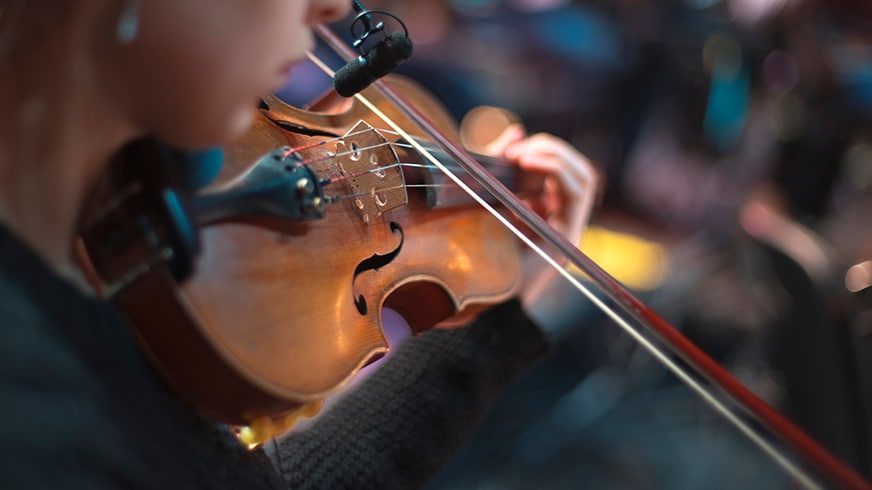Music has a redemptive power that reconciles us with each other and with the world in which we live. It is our happiness, our privilege - and decidedly our obligation as performing musicians.
Passing on musical heritage
We pass on the musical heritage of the past to an audience of today's generations, and it is our task to trace the resonance that the music we perform has or can have with listeners and finds today: what outlasts the years, what even seems to have eternal validity, or what suddenly unexpectedly illuminates its audience with quite extraordinary power. Works that sometimes seemed doomed to gather dust on library shelves, unnoticed and unperformed, can suddenly take on an astonishing new relevance and urgency.
Of course, much depends on the performers, on the indefinable way in which some manage to build a chemistry with the listener, and how they are able to convince with their approach, their commitment and their passion. And that leads to the subject of a style-conscious approach. It consists of grasping the sound world specific to a composer and a composition and harmonising the performance with it. This has preoccupied many of us for fifty years and more, and especially those with an insatiable thirst for history and therefore a fascination for recreating (as far as humanly possible) the original context in which the music was created: who commissioned it, for what occasion, with what instruments, in what instrumentation and with what aesthetic aims?
All of this was part of a growing reaction to the "one-style-fits-all" approach with which classical music tended to be performed, at least until the 1950s - and in some cases long after that. In contrast, the origins of the historical performance practice movement emerged. As a seventeen-year-old schoolboy, I found it very disturbing to experience Bach's Mass in B minor in an interpretation indistinguishable from Mahler's Lied von der Erde - both masterpieces, but opposites.
Classical music is being re-evaluated
However, whether we like it or not, over the past half century, historical performance practice has had a colossal impact on the way classical music has been perceived and re-evaluated. Admittedly, this historical performance practice began with only a very small pool of intrepid pioneers - often self-taught (and we should by no means underestimate the courageous, ground-breaking work of leading lights such as Harnoncourt, Leonhardt, Brüggen and the Kujken brothers).
The early attempts to recreate the soundscapes of the past were often still amateurish; exaggerations and false starts provoked the derision of many traditionally-minded professional musicians. This ghetto-like division into two camps lasted until the 1960s and left scars. My memories of those early years are bittersweet. There is a sense of elation and pride in looking back at all the ways in which boundaries were crossed and expanded - whether it was introducing Monteverdi to English audiences in the 1960s, or presenting a radically different approach to Bach's choral music to traditionally-minded audiences in Ansbach in the 1970s, or making Handel oratorios audible in a new way at the Handel Festival in Göttingen, or reintroducing French audiences to the baroque splendour of Rameau's operas. But those early years were also characterised by the struggle to find and secure patronage and sponsorship for our work.
Looking back, the situation has changed fundamentally and mostly for the better. The revelations from which the radical re-evaluations of the music of the last 400 years arose and have accompanied the repertoire have been widely welcomed, accepted and realised in recordings by major labels. The battle for technically flawless performance standards has been largely won and recognised, and scepticism and derision have largely fallen silent. The fact that some musicians have repeatedly switched from orchestras on standard instruments to historical instrumental ensembles has opened up channels which in turn have made stylistic penetration possible where previously bulwarks shielded each other. As a result, the best modern orchestral musicians today show far greater flexibility and a genuine curiosity to learn, adapt and experiment than in the past.
I have never seen the use of historical instruments as an end in itself or as a gateway to a magical world of "authenticity". No, rather as a starting point for research and stylistic exploration. As a guest conductor invited to work with such orchestras, I have always seen it as part of my responsibility to convey and share my historical and stylistic understanding with them - not in order to achieve a copy or imitation of a historical instrumentarium, but as a step towards an exciting synthesis between the original sound of an outstanding orchestra and my own approach to historical performance practice.
The ongoing process of performance practice
So has the battle for historical performance practice been won? Has a separate awareness of it become superfluous? Absolutely not! The debate and its implementation in historically aware practice is an ongoing process, a sign of fundamental curiosity, enriched by exploratory reflection and culminating in profound reappraisal. While the differences between a "modern" and a "contemporary" approach gradually diminish as one approaches the end of the 19th century, there are still discoveries to be made - to name just two examples - in the reconstruction of Debussy's sound world, or Stravinsky's ballets from the time of the First World War.
Just because there was so much new to discover in the 1980s to 1990s in the approaches that some of us developed as we rethought our approach and reappraised the music of Bach, Handel, Rameau, Gluck, Haydn and Mozart does not mean that we all now know how this music should go. Because we would be inviting a lazy way of thinking that substitutes one orthodoxy for another. That would be a travesty of the principles that underpin historical performance practice: exactly as represented by the exaggerated, albeit much vaunted, interpretation of Mozart's operas with dizzying tempi and enormous liberties in phrasing and structure that has emerged in recent years - a case of the emperor's new clothes.
